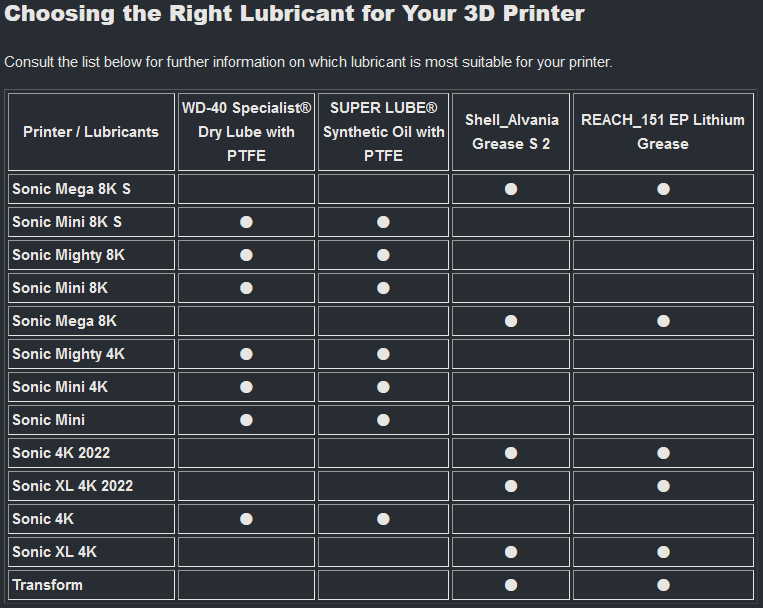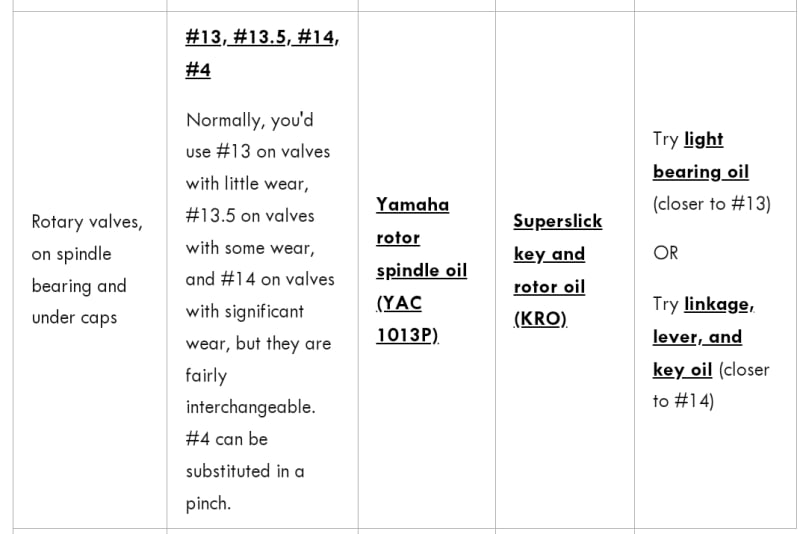Hi all,
The back story in a nut shell, I need to give some well earned TLC to the Z axis assembly of my 3D resin printer (Phrozen Sonic Mega 8K).
I did a bit of digging and found that the manufacturer of the printer suggests two specific greases specifically for the lead-screw (there are linear-rails as well) (1) Shell_Alvania Grease S 2 or(2)REACH_151 EP Lithium Grease.
The linear-rails were not mentioned in terms of what lubricant to use, but after some additional research I have found that the manufacturers tech. support suggested (on reddit) this lubricant, Yamaha YAC 1013P Rotor Spindle Oil.
One additional something that caught my attention, was the specificity of the greases for that specific printer model (reference image below, from manufacturers site), and that using the wrong kind of lubricant can upset the proper performance of the printer (for example a lubricant with rust removal properties).

The manufacturer sells spare parts but not the lubricants, and after searching for the suggested greases I found only "commercial" quantities of the stuff (e.g. 5kg or more).
The lead-screw drives the printing platform, and on a printer this large the post-layer-exposure peeling forces are quite substantial (from what I understand, it can get up to ~590N axially), although there is zero info on the hardware used in the printer or the forces.
Since I have zero experience with lubrication, I would like to get help in figuring out what alternatives for the suggested greases (other manufacturers with same properties and similar intended use) I can find that can be bought in a small quantity like a tube or a spray can (e.g. no more than 1kg, preferably up to 500gr).
Thanks,
SD
The back story in a nut shell, I need to give some well earned TLC to the Z axis assembly of my 3D resin printer (Phrozen Sonic Mega 8K).
I did a bit of digging and found that the manufacturer of the printer suggests two specific greases specifically for the lead-screw (there are linear-rails as well) (1) Shell_Alvania Grease S 2 or(2)REACH_151 EP Lithium Grease.
The linear-rails were not mentioned in terms of what lubricant to use, but after some additional research I have found that the manufacturers tech. support suggested (on reddit) this lubricant, Yamaha YAC 1013P Rotor Spindle Oil.
One additional something that caught my attention, was the specificity of the greases for that specific printer model (reference image below, from manufacturers site), and that using the wrong kind of lubricant can upset the proper performance of the printer (for example a lubricant with rust removal properties).

The manufacturer sells spare parts but not the lubricants, and after searching for the suggested greases I found only "commercial" quantities of the stuff (e.g. 5kg or more).
The lead-screw drives the printing platform, and on a printer this large the post-layer-exposure peeling forces are quite substantial (from what I understand, it can get up to ~590N axially), although there is zero info on the hardware used in the printer or the forces.
Since I have zero experience with lubrication, I would like to get help in figuring out what alternatives for the suggested greases (other manufacturers with same properties and similar intended use) I can find that can be bought in a small quantity like a tube or a spray can (e.g. no more than 1kg, preferably up to 500gr).
Thanks,
SD

